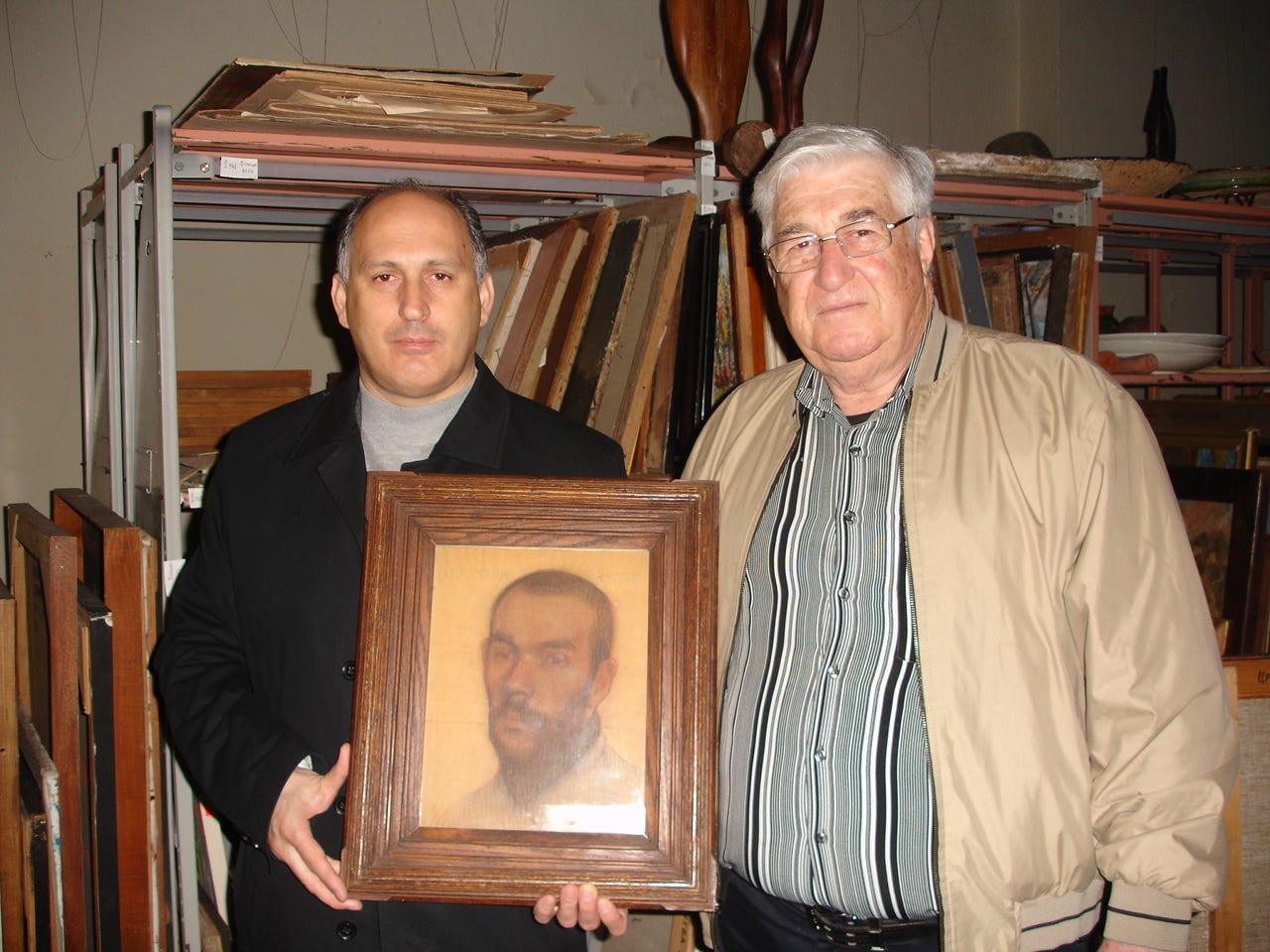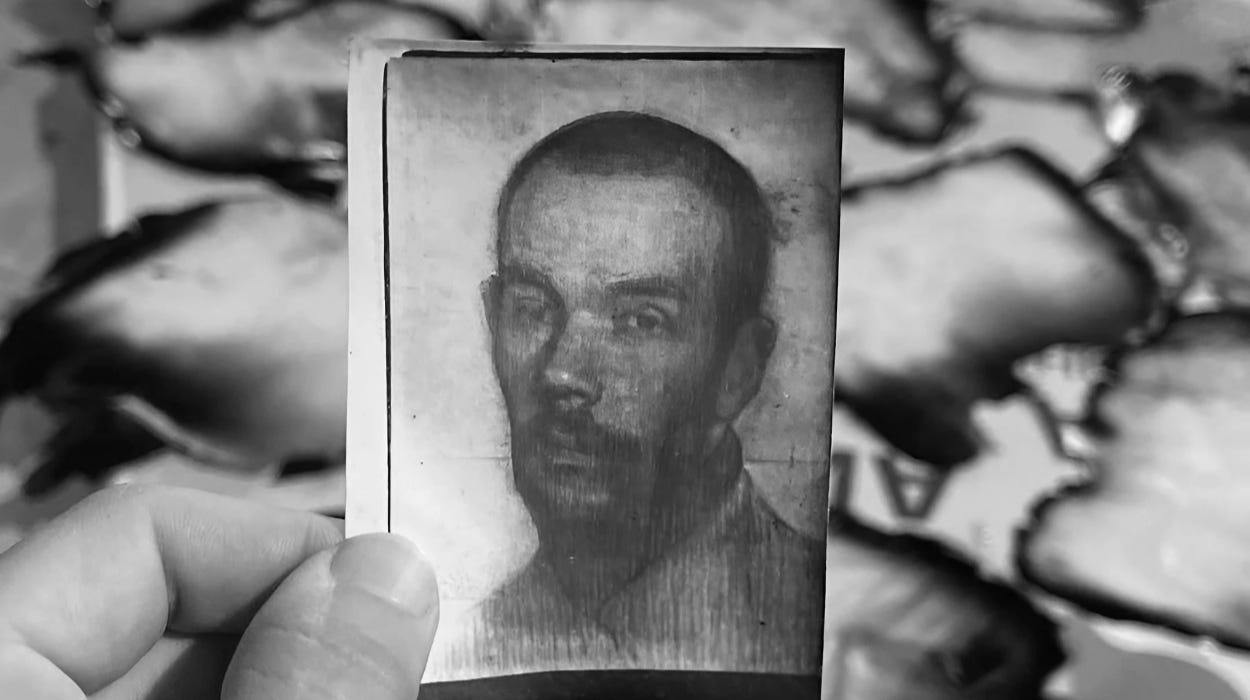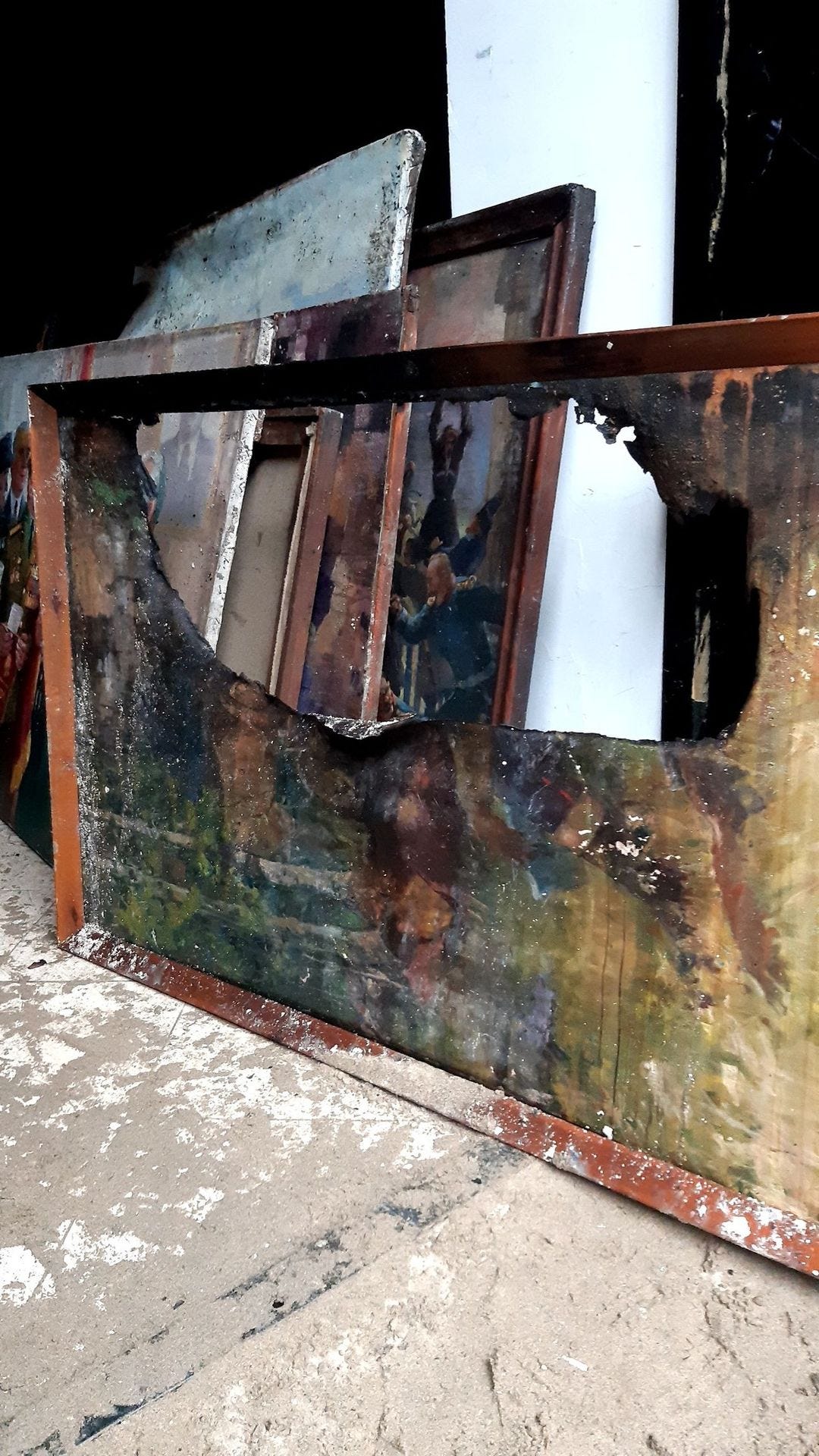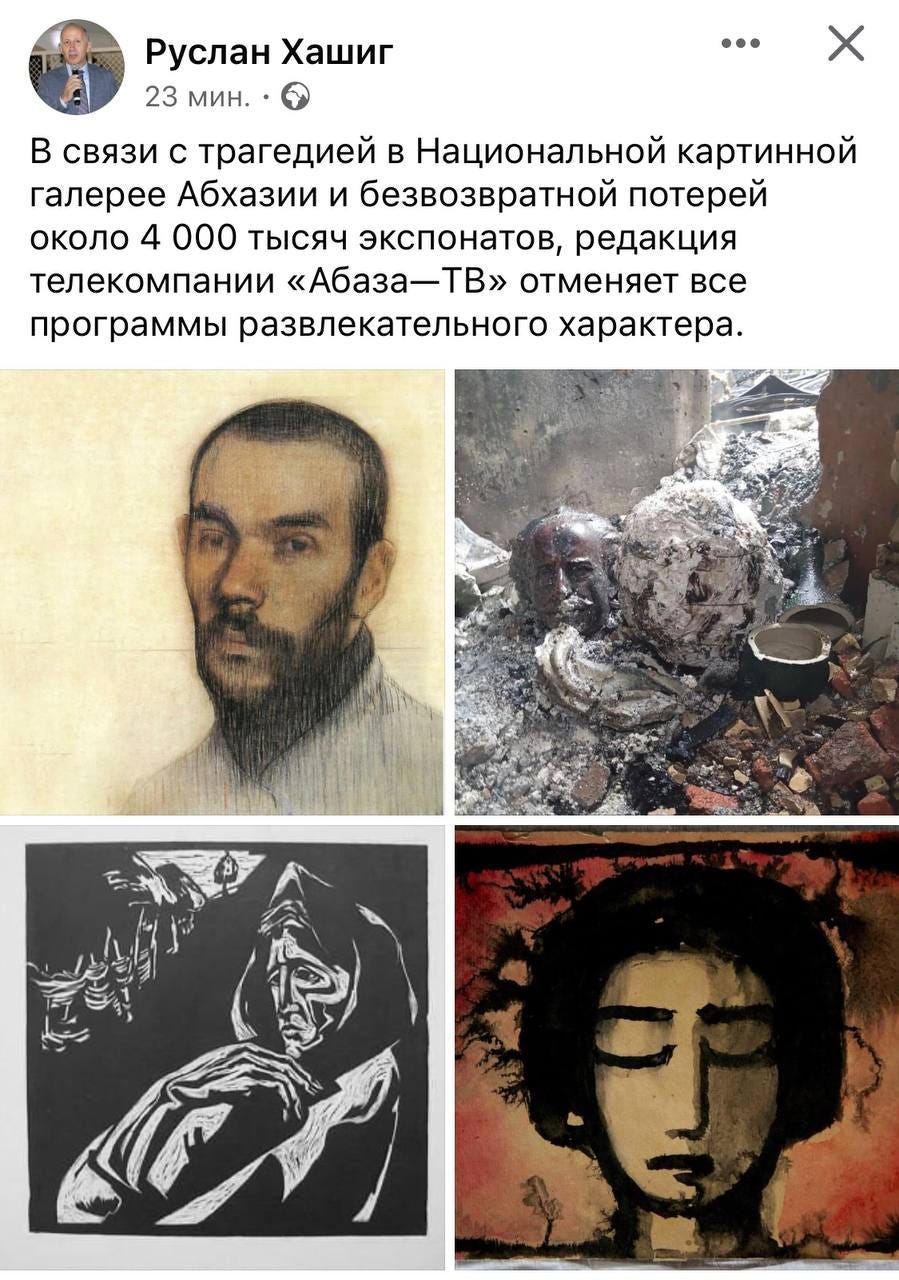Black Sunday: 21 January 2024, by Viacheslav Chirikba
Viacheslav Chirikba laments the loss of Abkhazia's art heritage in a fire, including Alexander Chachba-Shervashidze's works.
The following text is authored by Professor Viacheslav Chirikba, a distinguished linguist and former Foreign Minister of Abkhazia. He reflects on a heartbreaking incident: the fire in the Central Exhibition Hall of the Union of Artists of Abkhazia, which led to the tragic loss of nearly the entire collection of the National Art Gallery. Professor Chirikba's poignant words, shared on his Facebook page, delve into the depth of this cultural tragedy and its implications for Abkhazia's heritage.
"In her later years, Alexander Chachba-Shervashidze's daughter, Biana Alexandrovna, often asked me, "Slavik, what should be done with my father's archive?" She brought a rich collection from Monaco, including letters, posters, diaries, artworks, and photographs. I suggested donating it to the Abkhazian State Archive, but she hesitated, and the archive remained with her family. On 22 October 1992, the National Archive of Abkhazia was deliberately burned down by the Georgian army. Had Biana Alexandrovna followed my advice, Alexander Chachba-Shervashidze's invaluable archive would have met the same fate – turned to ash.
Thirty years ago, a magnificent portrait of Alexander Shervashidze by Vladimir Rossinsky was found in a Moscow private collection. Biana Alexandrovna and I attempted to acquire it for the Abkhazian museum but were unsuccessful. Decades later, a premonition led me to rediscover this portrait at an upcoming auction in Moscow. In a race against time, I reached out to the Prime Minister. With his immediate action to allocate funds, I secured the painting at the auction. It's now a property of our republic, narrowly escaping the same fate as the others in the Sukhum Art Gallery.
During Soviet times, I brought a Chachba gouache from Leningrad, a gift to Abkhazia. Later, in St. Petersburg, I found another significant Chachba work and informed Vladislav Ardzinba, leading to its acquisition for the Sukhum Gallery. Other significant works were also acquired over the years, including contributions from our compatriots in the USA. But now, all these have turned to ash.
Last year, I repeatedly appealed to the republic's authorities with an urgent request to move A. Shervashidze's works from the "storage" to a safer place, proposing to create a separate museum for the artist. In 2014, there was already a fire in the "storage," which was localised. I explicitly warned that next time we might not be so lucky, and we would lose our treasure, and that a fire in the storage was only a matter of time. But nothing was done.

A few months ago, sensing something, I appealed to the authorities of Sukhum to find a place for the safe storage of the world-famous artist's works. Again, nothing came of it! Thus, we lost the chance to save our treasure.
For three decades, I have been collecting materials for writing the biography of the artist's life and activities abroad. During this time, I compiled an interesting archive, including the artist's letters, posters with his name, memories of people who knew him, and many other interesting materials. I gathered all this at auctions, in antique shops in Russia, France, Spain, England. I planned to donate all this to the Alexander Shervashidze house-museum, once it was created, along with my personal collection of graphics and paintings, which I intended to donate to the museum. The same wish, in case of the museum's opening, was expressed by his great-granddaughter Tatiana, the keeper of the great-grandfather's archive, and the widow of Bocha Adzhindzhal, a researcher of the artist's work, who collected a rich archive related to his life and work.
However, it's now evident that the Alexander Shervashidze house-museum will never materialise. Approximately 300 of his invaluable works, desired by museums worldwide, were lost in the fire on 21 January 2024.
Is it a consolation that the artist's daughter Biana, his grandson Demosfen, and Bocha Adzhindzhal, who devoted his life to the artist's work, did not witness this horror? But how can those of us who understand the all-Russian, all-European, global significance of the artistic heritage of Prince Alexander Konstantinovich Chachba-Shervashidze, his contribution to the development of world theatrical art, be comforted?
In an American album on Diaghilev's Russian Ballets, Shervashidze's talent was declared genius. Yet, we, his compatriots, have failed his legacy, a legacy he preserved despite hardships, intending to pass it on to his beloved homeland. The bitter truth is evident. SHAME!"
"I feel extraordinarily sad when I think about the possibility that everything you hold dear in the Abkhazians, in our highlanders, might disappear. I imagine them to be tall, agile, very polite, with great dignity, silent, moderate in everything, resilient, and steadfast.
There is still much in them that Tolstoy described in 'Hadji Murat'—something so precious, so wonderful, that it gives one the right and joy to proclaim loudly: I am a highlander, I am Abkhaz."
— Alexander Shervashidze Chachba | Sukhum, 1917 (Rusudana Shervashidze-Chachba: Articles, essays, reviews)
Sergei Tsvizhba: "All of us, the entire nation. Everyone is equally responsible"
SUKHUM / AQW'A — In the devastating fire that ravaged the Central Exhibition Hall of the Union of Artists of Abkhazia overnight, the National Art Gallery's entire collection, housed on the second floor, was almost completely destroyed. Acting Minister of Culture Dinara Smyr reported the loss of over 4,000 art pieces, including more than 300 by the renowned artist Alexander Chachba-Shervashidze, a significant figure in Abkhazian art.
Abkhazian artist Vissarion (Sergei) Tsvizhba, amidst the rain, watched somberly as firefighters and volunteers carried out soaked and partially burnt paintings - the few remnants of the collection. His emotions and assessment of the event were profoundly pessimistic:
Elena Zavodskaya: What can you say about this tragedy?
Sergei Tsvizhba: I am not alive; we are living dead. What can I say?
Should someone be held responsible for this?
- All of us, the entire nation. Everyone is equally responsible.
For what exactly?
- For the state the National Art Gallery was in. We knew this would happen; we talked about it every time, with both the past leadership and the current one, but our concerns were met with zero attention.
How was the condition of the storage facility?
- Terrible. The paintings shouldn't have been left there. There was a fire here 15 years ago, during the day. We were all here, trying to remove the artworks, but it was impossible to save them all. That fire started from the rear part of the building due to the tenants. Thankfully, it was extinguished then.
What does the loss of the collection mean for Abkhazia, for the people, for artists?
- We are left without history, without a past, like savages. For me, it's comparable to the Latakia tragedy, that downed helicopter. It's irreparable.
What happens next?
- I don't know. The Union of Artists is also closed now. There's probably no future for us. For me, certainly no future, and perhaps for the young too, if we continue to treat ourselves this way. We are to blame for everything. The Georgians during the war couldn't do this, but we did.
“Our Government has the Blood of Our Culture on Its Hands”
"ҲараҲПицунда" ( Our Pitsunda) Youth Movement:
“When a person dies, memories remain. But what remains when a culture dies?
Today, no one knows what we have lost. Some can guess, having an idea of the extent of our collective sorrow. But we have not yet fully realised or understood it. We will understand later - in five years, in ten, in half a century. We will understand when we reach for the memory of our people, only to find ashes.
We lost more than just paintings. More than sculptures. We lost our friends, our great figures, our loved ones. And we lost ourselves. What made us who we are.
Everything that burned today could have been saved. It could have been saved, and there were attempts to save it. Artists have been demanding a gallery from the government for years. The problem of storage conditions has been raised for years. There were exhibitions, campaigns, speeches dedicated to this issue. No one wanted to solve it.
When the emergency services arrived, they couldn’t start extinguishing the fire because power outages hindered the water pumping, as the district had to be de-energized. All this could have been prevented.
This is not just a loss. It is not an accident, not a mere coincidence. It is a tragedy and a disgrace. Everyone who helped carry out the paintings from the burnt building had soot and paint on their hands. But our government has the blood of our culture on its hands.
Of course, we all bear responsibility. We should have demanded more, paid more attention, and achieved our goal. But we must not forget that in this situation, there are those who led us to this point with their negligence and indifference. They led us by the hand, showed us the ashes, and walked away, passing by artists stunned with grief, youth, and concerned citizens carrying charred canvases.
The archive was burned. ABNII was burned. Enemies did this to us. What happened today was done by our own people. We must not let them forget this. They must bear this responsibility. And we must not let this happen again.
We are tired of losing. Tired. We want to preserve what is left, restore what we can, and build anew. Do not dare to hinder us.
We will not give you anything more. Nothing.”
"This happened to me many times, when I said goodbye forever to everyone who left me forever."
Former Human Rights Commissioner Asida Shakryl:
“It's very hard! I am overwhelmed by feelings of loss, pain, and despair. I first experienced this feeling when I lost my brother Alkhas. He died during the liberation of Gagra. We couldn't find him. The search was unbearable, days filled with prayers for a miracle you know won't happen, but you still pray ceaselessly. Then, the news came that my father was mortally wounded. Again, that feeling of pain and loss, already so full within you, but you keep praying and praying. This happened to me many more times, as I forever said goodbye to each person who left me forever. This cascade of thoughts and feelings has been overwhelming me ever since I learned that almost the entire collection of the National Art Gallery had been burned. There will be no miracle, the loss is irreplaceable! We have forever lost a national treasure, a part of ourselves! I know that if there had been no war, if the enemy hadn’t shot my loved ones, they would still be with me. And I know who is responsible for my pain and loss. I also know who is responsible for what happened today, who should answer for depriving us of a huge part of our culture and history. And you know too. Do not stay silent, do not endure, do not reconcile! Do not give up!”
“Let us muster the courage to confront the harsh truth: we have earned this outcome!"
Roin Agrba: "We love grand funerals, don't we? The request has been honoured - today marks the grandest funeral since 1992, for a nation's spirit and its cultural wealth. The last bastion of our material culture, which by some miracle survived after museums, the Abkhazian National Academy of Sciences, and the state archives, today we definitively conclude with a tombstone declaration: 'Here lived the Abkhaz people!'I have no doubt that in the near future, in this most beautiful building, a luxurious star-rated hotel will be built. And it's not at all terrible that future generations will never see the masterpieces by Chachba and Bubnov, the works of our outstanding artists and sculptors. Many will quickly forget about this, and only the tears of cultural figures, artists, and the youth, who with tears in their eyes and covered in mud, saved these remnants of our culture, will remain in memory. The 'rescued' painting in the photograph painfully mirrors our country, plagued by criminal neglect and abandonment... Let us muster the courage to confront the harsh truth: we have earned this outcome!"
"Abaza TV Cancels Entertainment Shows"
General Director of "Abaza TV," Ruslan Khashig:
“In light of the tragedy at the National Art Gallery of Abkhazia and the irreparable loss of approximately 4,000 exhibits, the broadcasting team at "Abaza TV" is canceling all entertainment programs.”
“We've been stripped of our legacy, a warning bell that tolls for us all.”
Elvira Arsalia: Gathering my thoughts proves difficult, as I am deeply shaken by the recent events.
On January 21st, a terrible tragedy occurred; a fire erupted, consuming a large part of the collection of the National Art Gallery of Abkhazia, which housed works by A. Shervashidze, V. Bubnova, M. Eshba, V. Kontarev, B. Petrov, and others. We are left without our cultural memory.
For 37 years, the gallery's repository was housed on the second floor of the Artists' Union building. Despite waiting for construction, and occasional joint exhibitions at the Central Exhibition Hall, the gallery lacked a proper home.
Repeated pleas from director Suram Sakania and the Artists' Union for the renovation and reconstruction of the art gallery on Pushkin Street went unheeded. This failure to secure a permanent home for the gallery's collection and exhibitions has had dire consequences.
Artists have had to band together to protect the architectural gem on Pushkin Street, earmarked by President Vladislav Ardzinba for the gallery post-war, from those who eyed its conversion.
This morning, I received a call from the artist's great-granddaughter, Tatiana Shervashidze. Together we wept for the irreplaceable loss, facing an uncertain future for our cultural legacy.
This calamity is a collective one; we can't simply "close the gallery issue" and move on. We've been stripped of our legacy, a warning bell that tolls for us all.
The situation is bleak: the gallery's collection is decimated, and the historic Artists' Union building is severely damaged.
What now? Optimism is scarce, but we must learn from this, treasure the remnants that were saved, and seek to rebuild and enhance the collection. For the gallery, the country, the state, there's no alternative but to press on."
“Really, didn't anyone at least feel a twinge of discomfort?”
Izida Chania: “Imagine Notre-Dame Cathedral ablaze while Macron retreats to the Moulin Rouge, or the National Gallery of Brazil on fire as the president enjoys a bullfight. Or the Tretyakov Gallery engulfed in flames as Putin goes fishing...
No, such a scenario is only conceivable in our country, and only under President Bzhania.
The National Art Gallery's collection has burned down, and Aslan Bzhania chose to celebrate the past holidays with his staff at Stalin's dacha. Quite symbolic.
Yet, what astonishes me is not Bzhania, who by all accounts seems incapable of feeling the loss. It's his staff, the deputies... Really, didn't anyone at least feel a twinge of discomfort?”







